- Home
- Fay Weldon
Female Friends Page 2
Female Friends Read online
Page 2
While Inigo takes the mini from the garage Chloe rings Grace at her new Holland Park number and asks her where the Italiano is.
‘You’re much better off not knowing,’ says Grace.
‘Please. I’m in a hurry.’
‘Up a concrete walk-way at Shepherd’s Bush. Stick to the pasta and avoid the veal.’
‘And Grace, would you please speak to Stanhope. It’s school holidays. Easter. He arrived yesterday. Shall I bring him to the phone now?’
‘I’m busy packing,’ says Grace. ‘I’m going to Cannes with Sebastian this evening. I’ll send Stanhope a postcard. He’ll like that. He doesn’t really want to speak to me, you know he doesn’t. I embarrass him dreadfully on the telephone. We really don’t have anything in common. You do nag, Chloe.’
‘He’s your son.’
‘You only ever say that when it suits you. I suppose you’ve got Kevin and Kestrel there too?’
‘Yes.’
There is a pause. Many people hold Grace responsible for Midge’s death. Midge, who was Kevin and Kestrel’s mother.
‘What a martyr you are,’ is all Grace says. ‘And I suppose the French girl is in Oliver’s bed by now?’
‘Yes. As it happens.’
‘Congratulations. So now’s your chance. You can throw Oliver out of the house and divorce him and live off his money for ever.’
‘I don’t want to.’
‘What? Divorce him or live off his money?’
‘Either. I really must go. I’ll miss my train.’
‘I think it’s all rather sick,’ says Grace. ‘Do they make you watch?’
‘Don’t be silly,’ says Chloe, shocked.
Grace has a passion for detail. She will probe into tragedy and atrocity and insist on full details of childbirth, rape, heart-attacks, road accidents, suicides and murders, long after the teller is sick of the tale. ‘Yes, but what did he say? Did she scream? Did the eye-balls burst too? Where did he put it, exactly, and how? Did the steering-wheel show through his back? Yes, but where did they burn the after-birth?’ Grace knows all about after-births and how, by law, they have to be burned. And how if the mid-wife at a home delivery can’t find a suitable fire, she must carry it off to a hospital incinerator. Otherwise witches might get it.
‘If they don’t let you watch,’ says Grace, ‘it’s not just sick, it’s boring. Can you come round this afternoon after your lunch?’
‘Yes,’ says Chloe, though her heart sinks. Why? Grace is her friend.
‘Who are you having lunch with?’
‘Marjorie.’
‘I thought as much,’ says Grace. ‘Only Marjorie would be seen dead in the Italiano, and dead she will be if she touches the minestrone. Give her my regards and say I hope she keeps her moustache out of the soup.’
And she gives Chloe her new address and puts the phone down.
Grace, who is well over forty, lives with Sebastian, who is twenty-five. Chloe feels herself to be morally superior to Grace.
six
GRACE, MARJORIE AND ME.
Who would have thought it, when we were young.
Grace, so talented, so bold and desperate, now lives off men. Well, it is the way the world was arranged, most women do, and we all have to live somehow.
Grace complains of debt and recalcitrant lovers, but always seems to have a house to sell, a Rembrandt print to pawn, someone to take her out to dinner or fill her bed for the night. The rest of us fear poverty, deprivation, abandonment, separation, death. Grace fears the lack of a good hairdresser. She has no doubt been trained to this end, like one of Pavlov’s dogs, by a series of unpleasant experiences, but she was, I suspect, a more than willing victim in the experiment.
Grace is beautiful and frequently disagreeable and it is the latter quality, I sometimes think, which is more of an attraction than the former.
Grace remains beautiful as she grows older—it is as if she gains nourishment from her temper tantrums and her tears. She looks dreadful when she cries. I have seen her many times, her eyes red and swollen and ugly: her mouth swollen by blows, her neck marked not with love bites but the strangle marks she no doubt provokes. See her the next day, and who would have thought it. All is smooth and glossy again: a necklace round the firm white neck, the eyes clear, mocking and indifferent.
Grace wounds easily, but heals suspiciously quickly.
seven
MARJORIE, GRACE AND ME. How foolishly we loved.
Grace loved her Christie, arch-villain of a decade, and after that herself (and she is, as they say, her own worst enemy).
Marjorie loved and still loves her mother, who frequently forgot not just her name but her very existence.
I, Chloe, loved Oliver.
We all, at one time or other, loved Patrick Bates, and Marjorie still does, much good may it do her.
These days I hardly know what the word love means. My mother, I remember, once told me it was the force which keeps people revolving round each other, in fixed orbit, and at a precise distance, as the planets revolve around the sun; and the moon, that cold creature, around the earth.
My mother, poor dead soul, loved her employer, in secret, for twenty years, and he never once made physical love to her, so such a vision of love came easily to her. And it is certainly true that with the force which attracts us to other people comes a force which similarly repels—keeps us forever dancing and juggling in our inner spaces, like motes in a sunbeam, never quite close enough, always too near, circling the object of our affection, yearning for incorporation and yet dreading it.
I remember love’s enchantments. Of course I do. Sometimes something happens, like the sun across the garden in the morning, or a song, or a smell, or the touch of a hand—and the body remembers what love was like, and the soul lifts itself up, certain once again in the knowledge of its Creator; and the whole self trembles again in the memory of that elation, which once so transfigured our poor obsessed bodies, our poor possessed minds.
It did us no good.
eight
MARJORIE, GRACE AND ME. How foolishly we loved, and murderous we are. We have had six children between us, but have done to death, as if to balance the scales, some six of our nearest and dearest. And though the world does not acknowledge such deaths as murder, we know in our hearts that they are. No-one lies dead in a coffin but that our neglect has sent them there, or else it was our death wishes, sickening the air about them while they lived. Or perhaps we have overlain them with the great weight of motherly or wifely love, and crushed the life and spirit out of them.
Our fault.
Grace killed her Christie. It was the morning after his third marriage, to California: Grace had kept him awake all night by first telephoning, then ringing his front door bell, then shouting obscene instructions to California through the door, until the police removed her. The next morning, exhausted, he drove his new Maserati off the M1 and was killed, not instantly, but horribly. The alimony stopped with him, and Grace was left with nothing (in Grace’s terms) but a run-down house in St John’s Wood. California, that flower child, had shrewd lawyers and a marriage settlement which withstood almost instantaneous widowhood, and was overnight a millionairess.
Marjorie killed her Ben, with whom she was living (in the terminology of those days) in sin. Ben, changing a light-bulb one evening, reached out to take the new one from a slow-moving Marjorie, fell off his chair, hurt his neck, and later went down to casualty to see why it was hurting.
He’d been there three hours when the hospital rang and asked Marjorie to collect him, so she went along and was met by an old man in broken shoes and a white coat, who led her into a chilly tiled room, where the full moon glittered through opaque glass. He pulled out a drawer from the wall and there was Ben, lying dead. He’d cracked a vertebra when he fell, they told her later, and by some remote chance the two pieces of bone, grating together as he waited in the queue for attention, had snipped some vital nerve.
Marjorie was six months pregnant and it was h
er clumsiness, undoubtedly, which had caused Ben to stretch too far and fall. The baby was born prematurely, and died.
Two deaths to Marjorie’s account. She wasn’t even asked to Ben’s funeral—his family, too, assumed it was all her fault, murdering seductress that she was. And the baby didn’t have one. The doctor just wrapped it up and took it away, as the vet does with a dead animal.
As for me, Chloe, I killed my mother, sending her into the hospital to have a hysterectomy she never really wanted. The womb, that little organ, so small when not in use, in her case past functioning, was cancerous after all and not merely, as I insisted, plugged with fibroids.
And it is amazing how once the word is said, the disease, dormant until the moment of recognition, proliferates and spreads. It is as if the body catches an idea and then can’t get it out of its mind. Mother didn’t want to go into the hospital: it was my idea. I was irritated by her passivity; I felt it must have a physical cause, somewhere in the roots of her female nature. If they’d only cut it out for her, I thought, excise it once and for all, she would be better, would look after herself, stop suffering, stop forgiving and understanding me, my children, my husband, and my friends, and her own oppression.
But all my mother did was die, as if that tiny, useless organ was the very mainspring of her being.
nine
INIGO DRIVES HIS MOTHER Chloe to Egden station. He drives without hesitation or fear, calmly and sensibly, clearly regarding the machine as a useful tool and not as an outlet for any suppressed and disagreeable aspects of his personality.
She cannot think what she has done to deserve this paragon, with his broad shoulders and friendly eyes, smooth olive skin and glossy black springing hair, so like his father in looks but so unlike in temperament, who deals with her affectionately, and his father with a respectful deference only slightly tinged with mockery: who passes his exams, takes drugs in moderation, avoids his enemies and understands his friends, who are multitude; and now not only drives her to the station, but offers to.
Perhaps, she thinks, out of the flat Essex countryside, which to her is featureless to the point of oppression, ripe only for cabbage-growing, air-fields and urban development, Inigo has wrung whatever is calm and good: or else, more like it, has made his own pocket of grace and beauty in which to grow, since God has declined to do it for him.
Even the hedgerows of her childhood have gone now, uprooted in the cause of progress and cabbage-cropping machinery. The sun has gone in. The early promise of the day has gone. The few trees left stand brown and crusty with old creepers: the fields are untidy with the winter’s debris.
What fate, Chloe wonders, has condemned her to live her life in these few square miles of England? First, long ago, as Gwyneth’s daughter, in Ulden, with Marjorie and Grace for friends. Then, after a brief respite, as Oliver’s wife in Egden, ten miles down the railway line.
And where the Egden supermarket now stands, was the cottage-hospital where Grace was born, first and only child of Edwin and Esther Songford. Or so they assumed—Grace had a tendency to deny their parentage, and with it her duty towards them. And not without a withered shred of justification too—for a year or so after Grace’s birth the market town of Egden and its outlying villages rocked to a scandal which closed the cottage-hospital entirely, the elderly and eccentric matron having conceived a fresh scientific system of tagging new babies according to their toe prints, which resulted in confused nurses and almost certain mis-identification of the infants, and the necessary reallocation, more than three years later, of six children amongst six couples, on the strength of blood-tests, physical appearance, established temperament and, of course, parental instinct. To the delight of the press, both national and foreign. Six for sure, and how many others not for sure? It was Grace’s fancy to allocate herself in her mind, throughout her childhood and afterwards, to many a rich and noble couple. The belief that one has been switched at birth is common enough in little girls—and give Grace an inch, like a mad matron, and she’d take an ell, and never wash up for her mother, not even on the help’s day off.
The Songfords lived in Ulden, in a solid Edwardian house called The Poplars. It had a good-sized garden, a wind-break of poplar trees, a swing for the children, a tennis court, large attics, a gardener, a daily, a pantry full of bottled fruits and jams, living rooms with chintzy curtains and squashy sofas, Persian rugs, Chinese carpets, much bamboo furniture. Eastern bric-à-brac, mementos of the Indian army from which Grace’s father had been cashiered, and one small bookcase containing the Encyclopaedia Britannica in twelve volumes, some guide books, an atlas, two novels by Dornford Yates, and three thrillers by Sapper and the Light that Failed by Rudyard Kipling.
It was to this house that Marjorie was evacuated, in 1940, coming on a train which stopped in Ulden by mistake. As for Chloe, she was on the train by mistake and it was only by this first fortunate accident that she and her mother Gwyneth, on her way to a domestic job at the Rose and Crown, were able to alight at Ulden.
When we are children, so much happens by mistake. As we grow older, and see a pattern to things, we are obliged to agree that there is no such thing as an accident. We make tactless remarks because we wish to hurt, break our legs because we do not wish to walk, marry the wrong man because we cannot let ourselves be happy, board the wrong train because we would prefer not to reach the necessary destination.
As for a train which stops at the wrong station, disgorges sixty children at the wrong place, and changes the course of all their lives, what are we to say to that?
ten
PICTURE THE SCENE NOW, that autumn morning in 1940, as the train which carries Marjorie and Chloe approaches Ulden. Grace is waiting at the station with her father who is uncrowned king of the village, a princess dressed like a prince, in trousers and sweater, contrary to her mother’s spoken request, but in accordance with her mother’s deepest wishes. Her mother wanted a boy.
Chug-chug, puff-puff, across the flat fields. It’s like a scene from Toy Town. The day is hot, and calm, and blue. There’s panic in London, but not here. War clouds may be lowering somewhere over to the South East, but here they’re nicely silver-lined with protected farm prices and agricultural subsidies. Full employment in the area at last, laying run-ways for Spitfires on Ulden Common. And out of that cloud, clear into the sunshine, comes the train with two coaches. Its white smoke drifts prettily over the fields, where they’re taking out the daffodil bulbs and laying down potatoes.
Inside the Toy Town train, the picture is not so pretty. The coaches (all that could be spared) are crowded with terrified, weeping, rioting, vomiting and excreting children. There are no WCs. The floors are aswill. These are the evacuees from London. They have been briskly labelled and sent off for their own safety, out of the way of Hitler’s bombs. Many haven’t been able to say good-bye to their parents, most don’t know what’s happening to them. Quite a few would certainly rather be dead than here.
Little Chloe, of course, sits well-behaved and upright amidst the uproar, with her hand firmly in her mother Gwyneth’s. Mothers are clearly a precious commodity on this particular train. And as for Gwyneth, she is feeling quite faint with distress. She is surrounded by misery and filth and deprived of her usual tools for coping—water, soap, bucket, and cloth.
Moreover, being on this train by accident, having mistaken Platform 7 for Platform 8, Gwyneth has been separated from two trunks in which are all her worldly possessions, neatly packed, folded, and interlarded with tissue. What now most preoccupies her is that in the elasticated silk pocket of the smaller trunk, along with the birth certificate and the careful roll of her husband’s tiny landscapes, is his medical record card. This she stole from the hospital where he died, and this she is always fearful will be discovered by someone in authority and used as evidence of her crime. All the same, she has not been able to bring herself to destroy it. Now she wishes she had. Supposing the trunk is searched, the card found, and herself sent to prison? What will ha
ppen to Chloe?
What will happen to Chloe? It has been the theme song of Gwyneth’s life for the past ten years.
Gwyneth resolves to destroy the card the minute the trunk reaches the Rose and Crown. She is starting a new life as barmaid and general domestic help, in return for board and lodging for herself and Chloe, and five shillings a week pocket money.
It is as well Gwyneth is so fond of cleaning, for being a widow with a child, this is the direction in which her future clearly lies.
eleven
OPPOSITE CHLOE AND GWYNETH, sits a plain, thin, tearful child, with pale, deep-set, slightly squinty eyes peering out from beneath a creased brow. Marjorie. She has a mass of frizzy hair, which is kept back from her forehead by a battery of brown metal hair clips. She is not accustomed to the language and behaviour of the other children in the coach. Until recently Marjorie has lived a protected life. Then her father Dick upset everyone by volunteering for army service and her mother Helen took her away from her private school in the country, and enrolled her in the local state school which promptly closed. Now, re-opened for just one week, the school has been evacuated, and Marjorie with it.
Or, as the lovely, highly-principled Aryan Helen, Marjorie’s mother, wrote to her handsome, tormented, highly-principled Jewish husband, Marjorie’s father, only the night before:
‘We’re all in this together. It’s best for Marjorie to take her chance with the others. I believe she’s going somewhere in Essex. The country air should be good for her spots—I’m afraid London aggravated them shockingly. I’ll be down to see her as soon as possible, though you know what the trains are like, and actually I’ve offered the house as a hospitality centre for Polish Officers and am acting as hostess, so you can imagine how busy I’m going to be. Don’t worry—I’ve packed all your books and papers safely away in the attics—and cleared the library for the dancing. Poor fellows—what a dreadful business this war is: they deserve all the relaxation they can get.’

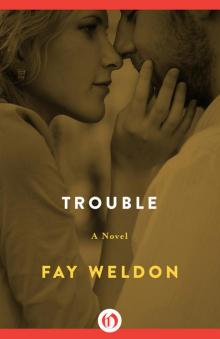 Trouble
Trouble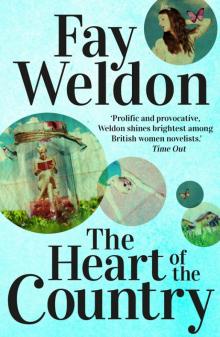 The Heart of the Country
The Heart of the Country Wicked Women
Wicked Women Mischief
Mischief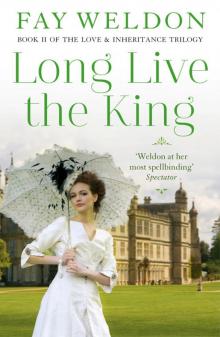 Long Live the King
Long Live the King Remember Me
Remember Me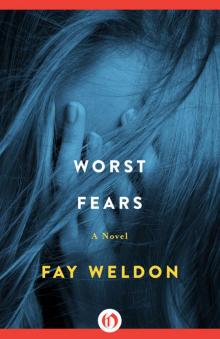 Worst Fears
Worst Fears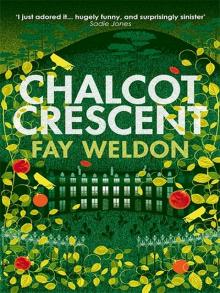 Chalcot Crescent
Chalcot Crescent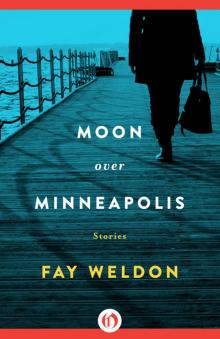 Moon Over Minneapolis
Moon Over Minneapolis The New Countess
The New Countess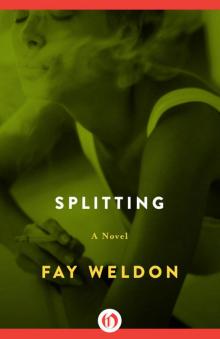 Splitting
Splitting After the Peace
After the Peace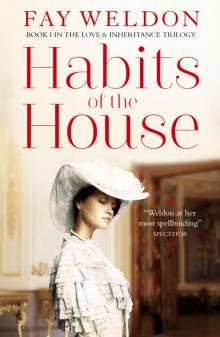 Habits of the House
Habits of the House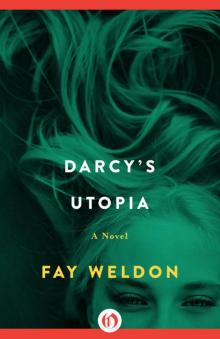 Darcy's Utopia
Darcy's Utopia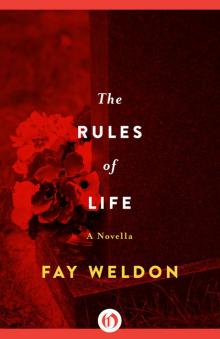 The Rules of Life
The Rules of Life Kehua!
Kehua! Before the War
Before the War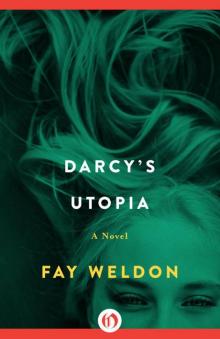 Darcy's Utopia: A Novel
Darcy's Utopia: A Novel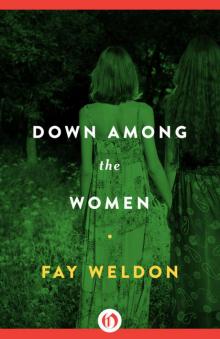 Down Among the Women
Down Among the Women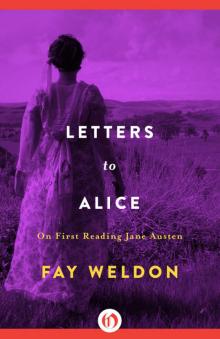 Letters to Alice
Letters to Alice 3 Great Historical Novels
3 Great Historical Novels Female Friends
Female Friends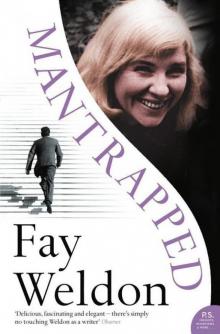 Mantrapped
Mantrapped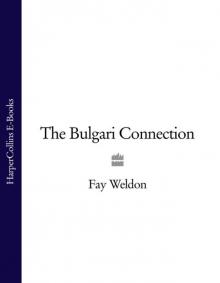 The Bulgari Connection
The Bulgari Connection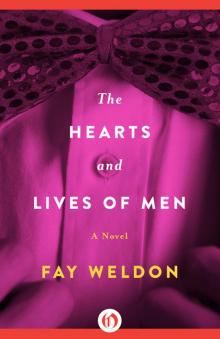 The Hearts and Lives of Men
The Hearts and Lives of Men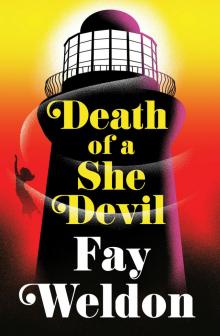 Death of a She Devil
Death of a She Devil